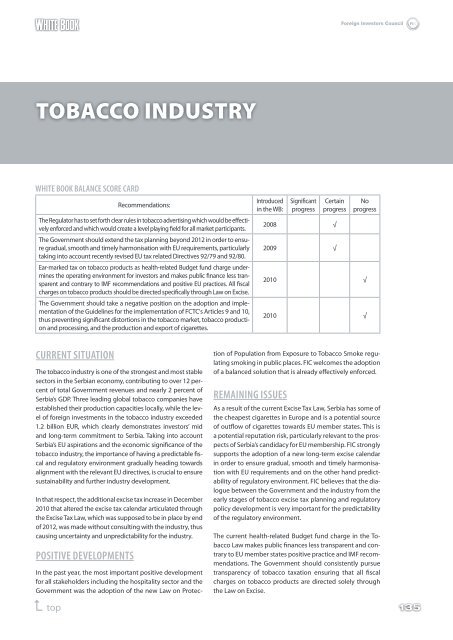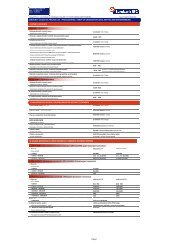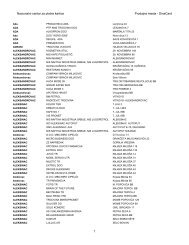Fic rEcommEndationS - Eurobank EFG
Fic rEcommEndationS - Eurobank EFG
Fic rEcommEndationS - Eurobank EFG
You also want an ePaper? Increase the reach of your titles
YUMPU automatically turns print PDFs into web optimized ePapers that Google loves.
TOBACCO INDUSTRY<br />
WHitE BooK BaLancE ScorE card<br />
cUrrEnt SitUation<br />
The tobacco industry is one of the strongest and most stable<br />
sectors in the Serbian economy, contributing to over 12 percent<br />
of total Government revenues and nearly 2 percent of<br />
Serbia’s GDP. Three leading global tobacco companies have<br />
established their production capacities locally, while the level<br />
of foreign investments in the tobacco industry exceeded<br />
1.2 billion EUR, which clearly demonstrates investors’ mid<br />
and long-term commitment to Serbia. Taking into account<br />
Serbia’s EU aspirations and the economic significance of the<br />
tobacco industry, the importance of having a predictable fiscal<br />
and regulatory environment gradually heading towards<br />
alignment with the relevant EU directives, is crucial to ensure<br />
sustainability and further industry development.<br />
In that respect, the additional excise tax increase in December<br />
2010 that altered the excise tax calendar articulated through<br />
the Excise Tax Law, which was supposed to be in place by end<br />
of 2012, was made without consulting with the industry, thus<br />
causing uncertainty and unpredictability for the industry.<br />
PoSitiVE dEVELoPmEntS<br />
In the past year, the most important positive development<br />
for all stakeholders including the hospitality sector and the<br />
Government was the adoption of the new Law on Protec-<br />
� top<br />
Recommendations:<br />
The Regulator has to set forth clear rules in tobacco advertising which would be effectively<br />
enforced and which would create a level playing field for all market participants.<br />
The Government should extend the tax planning beyond 2012 in order to ensure<br />
gradual, smooth and timely harmonisation with EU requirements, particularly<br />
taking into account recently revised EU tax related Directives 92/79 and 92/80.<br />
Ear-marked tax on tobacco products as health-related Budget fund charge undermines<br />
the operating environment for investors and makes public finance less transparent<br />
and contrary to IMF recommendations and positive EU practices. All fiscal<br />
charges on tobacco products should be directed specifically through Law on Excise.<br />
The Government should take a negative position on the adoption and implementation<br />
of the Guidelines for the implementation of FCTC's Articles 9 and 10,<br />
thus preventing significant distortions in the tobacco market, tobacco production<br />
and processing, and the production and export of cigarettes.<br />
Introduced<br />
in the WB:<br />
tion of Population from Exposure to Tobacco Smoke regulating<br />
smoking in public places. FIC welcomes the adoption<br />
of a balanced solution that is already effectively enforced.<br />
rEmaininG iSSUES<br />
Significant<br />
progress<br />
Certain<br />
progress<br />
2008 √<br />
2009 √<br />
No<br />
progress<br />
2010 √<br />
2010 √<br />
As a result of the current Excise Tax Law, Serbia has some of<br />
the cheapest cigarettes in Europe and is a potential source<br />
of outflow of cigarettes towards EU member states. This is<br />
a potential reputation risk, particularly relevant to the prospects<br />
of Serbia’s candidacy for EU membership. FIC strongly<br />
supports the adoption of a new long-term excise calendar<br />
in order to ensure gradual, smooth and timely harmonisation<br />
with EU requirements and on the other hand predictability<br />
of regulatory environment. FIC believes that the dialogue<br />
between the Government and the industry from the<br />
early stages of tobacco excise tax planning and regulatory<br />
policy development is very important for the predictability<br />
of the regulatory environment.<br />
The current health-related Budget fund charge in the Tobacco<br />
Law makes public finances less transparent and contrary<br />
to EU member states positive practice and IMF recommendations.<br />
The Government should consistently pursue<br />
transparency of tobacco taxation ensuring that all fiscal<br />
charges on tobacco products are directed solely through<br />
the Law on Excise.<br />
135




